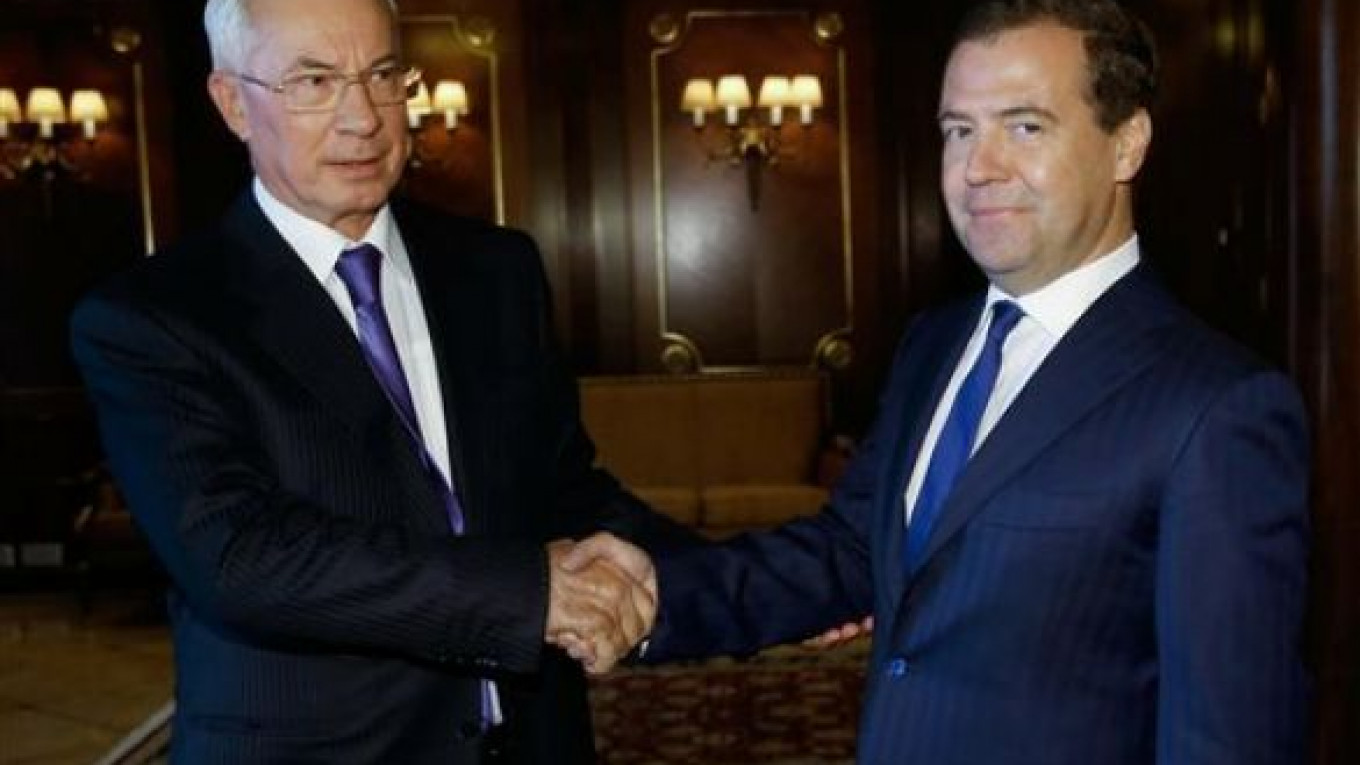Ukrainian Prime Minister Mykola Azarov on Wednesday signaled that his country would not back out of its push toward free trade with the European Union despite Russian pressure.
Azarov's statements at a meeting of his Cabinet follow a brief spell of sweeping checks for Ukrainian imports in Russia, which stalled trade earlier this month. Russia said the cumbersome procedure could become permanent should Ukraine sign a free trade pact with the European Union in November.
In the first public statement after Azarov discussed the prospects with his Russian counterpart Dmitry Medvedev in Moscow earlier this week, Azarov said Ukraine wouldn't budge.
"It needs to be treated as reality that Ukraine will create a free trade zone with the European Union after it signs an association agreement with the EU," he said, according to a statement on the Cabinet's website.
Moscow expressed concerns that EU goods that would enter Ukraine free of import duties could then push Ukrainian goods to flood Russia and undercut the Russian market. President Vladimir Putin is instead nudging Ukraine to join Belarus and Kazakhstan in the Russia-led Customs Union.
Membership in the Customs Union would close the door for Ukraine to a free trade deal with Europe.
In a bid to appease Moscow, Azarov on Wednesday reiterated his country's proposals of partial integration with the Customs Union, saying Kiev was willing to join some of the agreements that exist among its members. He did not name the agreements.
Azarov ordered that Ukraine's representative at the Customs Union governing body, Viktor Suslov, develop a road map for the move. He also told the ministers for trade, revenues and foreign affairs to put together a practical plan to cooperate with the group if Ukraine joins the EU free trade zone.
"It's these practical things that we will discuss with Russian partners," he said.
Russia is not buying the idea of a double-dipping Ukraine, according to recent statements by First Deputy Prime Minister Igor Shuvalov and Kremlin aide Sergei Glazyev.
Azarov is simply attempting to show Ukrainians that he is dealing with the dilemma, said Volodymyr Fesenko, director of the Penta political studies center in Kiev.
Stepping into the fray, Ukraine's Foreign Ministry said Wednesday that Ukraine seeks to remain a strategic partner of Russia. It was responding to Glazyev, who said earlier this week that Ukraine would sever its close ties with Russia by signing the EU deal.
It is not fully certain that the EU will agree to sign the association agreement with Ukraine at the coming summit in Vilnius, a move that opens the way for free trade. EU Enlargement Commissioner Stefan Fuele said Tuesday that Europe is questioning Ukraine's progress on democratic reforms and the jailing of former Prime Minister Yulia Tymoshenko, who is incumbent Ukrainian President Viktor Yanukovich's vehement political foe.
Russia started the additional checks of Ukrainian imports earlier this month after Putin paid a visit to that country and apparently failed to convince Yanukovich to change course. After the checks ended, Putin commented last week that the Customs Union would have to think about protecting its market in the event that Ukraine goes through with the EU agreement.
Contact the author at medetsky@imedia.ru
A Message from The Moscow Times:
Dear readers,
We are facing unprecedented challenges. Russia's Prosecutor General's Office has designated The Moscow Times as an "undesirable" organization, criminalizing our work and putting our staff at risk of prosecution. This follows our earlier unjust labeling as a "foreign agent."
These actions are direct attempts to silence independent journalism in Russia. The authorities claim our work "discredits the decisions of the Russian leadership." We see things differently: we strive to provide accurate, unbiased reporting on Russia.
We, the journalists of The Moscow Times, refuse to be silenced. But to continue our work, we need your help.
Your support, no matter how small, makes a world of difference. If you can, please support us monthly starting from just $2. It's quick to set up, and every contribution makes a significant impact.
By supporting The Moscow Times, you're defending open, independent journalism in the face of repression. Thank you for standing with us.
Remind me later.






